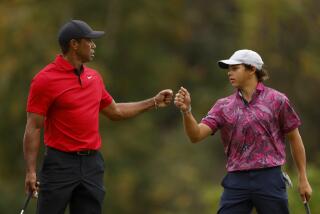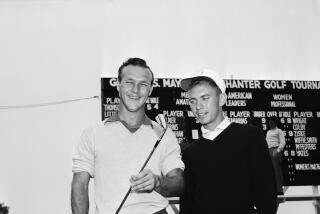Langert Golf’s Prince Charming : Recreation: The struggling Carlsbad-based equipment maker has a new lease on life after being acquired last month by the mega-firm.
- Share via
Deus ex machina , or “god from a machine,” is a theatrical term dating from ancient times and is used to describe an implausible character or event that intervenes to save the hero from certain disaster.
For Carlsbad-based Langert Golf Co., there couldn’t be a more perfect description of Prince Holdings, the well-known racquet sports equipment manufacturer based in Princeton, N.J., that last month acquired Langert for $1.4 million.
The deal not only rescued Langert Golf, a 5-year-old golf club manufacturer that had fallen on hard times; it also set the stage for Langert’s encore performance as a much stronger company backed by one of the sporting world’s more powerful manufacturers.
Before the acquisition, Langert had fallen out of compliance with covenants on a $1.4-million line of credit with its bank. The company had laid off half its employees and was hit hard by the industrywide slump in golf club equipment that in the past two years has turned a go-go industry into a bit of a quagmire.
After peaking at $7 million in sales in 1990, Langert’s sales slumped to half that this year. But many golf club manufacturers are in the same boat. The explosion in golf’s popularity--and equipment sales--during the 1980s launched scores of golf club companies, many of which are ill-equipped to ride out the current hard times.
But Langert had good products--a set of metal woods called Fat Eddies and irons called Tour de Force--that found acceptance among many touring golf professionals and top amateurs. Priced at up to $2,000 per set, Langert’s clubs were definitely for the serious golfer.
Another asset was its founder and chief executive, Eddie Langert, a 56-year-old charismatic marketing whiz, club designer and former touring pro.
Before leaving to start up his own company, Langert held top marketing jobs with Taylor Made, another Carlsbad club manufacturer that revolutionized the industry when it introduced the first widely accepted set of metal woods in 1980. In fact, Langert Golf is situated within a 3-iron shot of the Taylor Made and Cobra Golf plants, as well as others that have earned Carlsbad the sobriquet the “Golf Coast.”
At the same time Langert Golf was foundering, Prince Holdings was looking to expand into golf. The company had become a powerhouse in racquet sports as a leading manufacturer of Prince tennis racquets and Ektelon squash and racquetball racquets.
Prince Holdings, which is owned by Egizione Holdings, which in turn is controlled by the same Italian family that owns the Benetton retail apparel empire, has annual sales of more than $200 million. (The company also sells ski boots, skis and roller skates.)
Last year, Prince acquired American Ball, a Dallas-based golf ball maker, after buying Grafalloy, a golf club shaft maker based in El Cajon, in 1983. All the company needed was to acquire a “finished” golf club manufacturer to provide it with the market experience it otherwise would have to spend years developing.
Langert Golf fit the bill to a tee, Prince general counsel Richard Miller said last week.
“Eddie Langert, who is one of the founders of Taylor Made, was particularly interesting to us because of his background in product development, marketing and sales,” Miller said. “He’s a pretty unique person, and with the organization he built, he has an opportunity to become much bigger and more successful with more funding behind him.”
Although Miller would not comment on specific plans Prince has for Langert Golf, he did say that the rest of 1992 will be a “hold steady” period during which Langert will cultivate a market and plot its strategy.
By 1994, Prince expects to see a “dramatic increase” in Langert sales, partly by virtue of an “appropriate investment” in capital equipment and marketing.
Part of that capital investment in Langert will be to buy a $140,000 “Iron Mike” golf ball-hitting machine used by ball and equipment manufacturers to test their products. The company said having an Iron Mike all to itself will be a significant advantage for Langert over competitors, many of whom have to rent time on the machines.
“Why Langert? What Prince is trying to do is complete their golf story. They own American Ball, Grafalloy, and they are trying to complete the picture. They were looking for a big name because everything else the company owns is a power company,” said Scott M. Kramer, senior editor of Golf Pro Merchandiser, a trade publication published in New York.
“Langert Golf has a good reputation, and Eddie is one of the most honest, nicest people around,” Kramer said.
Eddie Langert has strong connections to tournament professionals and to what the trade calls “green grass” club pros who sell equipment at golf courses.
Although “street” retail facilities such as Polar Golf and Roger Dunn now account for more than 70% of golf equipment sales nationwide, club manufacturers generally must establish their reputations with the club and touring pros who play with the equipment and who recommend it to members.
Langert was hired away from his St. Paul, Minn., club professional’s job in 1980 by Gary Adams, founder of Taylor Made. Adams wanted Langert because of his tournament background and because, in Miller’s words, Langert “could sell ice to Eskimos.” Adams made Langert a marketing executive.
Langert was with Taylor Made as a marketeer and designer through most of its phenomenal growth period that saw sales shoot from $2 million in 1980 to $130 million in 1989. But the acquisition of the company by Solomon of France resulted in restructuring that was not to Langert’s liking, and he quit Taylor Made in 1987 to start his own company.
The company struggled continuously, however, because it was undercapitalized. Last year, for instance, it budgeted just $78,000 for marketing expenses, enough for a single-page advertisement in Golf Digest, which costs $60,000, Langert said. By contrast, Taylor Made usually buys nearly 60 full-page ads in Golf Digest every year, he said.
With Prince Holdings for a parent, Langert sees better times ahead. “We found exactly what we were looking for,” he said.
More to Read
Inside the business of entertainment
The Wide Shot brings you news, analysis and insights on everything from streaming wars to production — and what it all means for the future.
You may occasionally receive promotional content from the Los Angeles Times.










